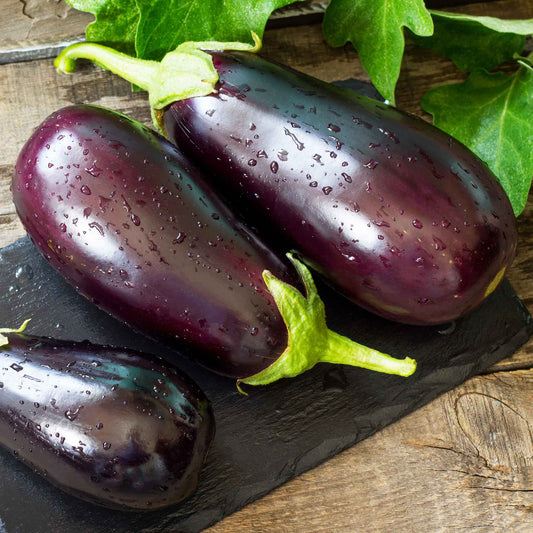-
main-collection-product-grid

Eggplant Seeds (Organic) - Black Beauty
Set the standard for eggplants for over a centuryEggplant Seeds (Organic) - Black Beauty
Set the standard for eggplants for over a centuryRegular price As Low As $6.99Regular priceUnit price per -
main-collection-product-grid

Eggplant Seeds (Organic) - Long Purple
Italian heirloom with firm, mild fleshEggplant Seeds (Organic) - Long Purple
Italian heirloom with firm, mild fleshRegular price As Low As $7.99Regular priceUnit price per
What we love about growing organic eggplants
- Also called aubergine or guinea squash
- A drought tolerant, warm-season vegetable
- Thrives in bright, sunny growing areas
- Tropical, herbaceous, perennial plants closely related to the tomato
Grow (and eat!) the best organic eggplant
In other areas of the world, eggplant is known as aubergine or brinjal. It is a nightshade family plant that is produced for its edible fruit. The spongy and absorbent fruit of the eggplant gained popularity as a result of its capacity to absorb flavors in a range of cuisines. Despite the fact that it is technically a fruit (a berry), it is most usually used in cooking as a vegetable. Not just for the Italian speciality eggplant parmesan, eggplant is used extensively in East Asian, South Asian, French, Mediterranean, and Middle Eastern cuisines. It's interesting to note that eggplants were originally thought to cause madness among Italians. The reason for this was that eggplants are nightshades, and some kinds of nightshades are poisonous. Don't worry, organic eggplants are both safe and tasty! In fact, they contain Nasunin, a powerful antioxidant that fights oxidative stress and inflammation. Nasunin also aids in the absorption of iron in the body. Because this antioxidant is contained in the skin of the eggplant, don't peel it if you want to get an extra dose of antioxidants.
How to grow organic eggplant in your garden
Organic eggplants are a popular tropical perennial plant with a wide range of uses. Although there is no universal agreement on their origins, many people believe they are native to Africa, South Asia, or India, where they are still seen growing wild. If you want to produce organic eggplant in your garden, all you need is a little planning, the proper environment, and some care.
Indoors, start your seed in tiny pots. Place the pots in a warm area after watering them and covering them with plastic. As the seedlings germinate, keep them moist. It normally takes seven to fourteen days for seeds to germinate. Once the seeds have germinated, the plastic may be removed and the pots or trays placed to a strong light or a window. For the following eight to ten weeks, keep the seedlings hydrated as they grow. After hardening off, the organic eggplant may be transplanted outside when the soil temperature outside reaches 60°F.
When to harvest organic eggplant
When the skin of the eggplant is shiny, it is ready to harvest. The fruit is unlikely to become bigger after this occurs. Depending on the type, this is usually two to three months after planting.
For more information about planting, growing, and caring for organic eggplant seeds, see the Eggplant Seeds Planting Guide.

